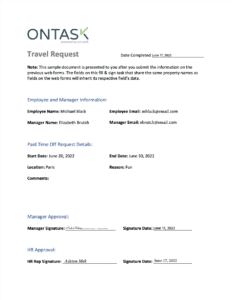Sales operations are to sales what a foundation is to a house. Without sales operations, your sales efforts are left to trial and error – or worse, constant guesswork. But sales ops changes this by grounding everything the sales team does in sound data and objectives. Automation can make the process even more efficient.
Let’s dive in.
What Is Sales Operations & Why Is It Important?
Sales operations equip sales teams with the tools, strategies, and training they need to execute an effective sales process. A good sales ops process is data-driven and leverages current technology to streamline workflows, keeping sales teams more efficient and cost-effective.
Eliminating guesswork, increasing revenue, and automating everything from workflows to contract management are just a few of the advantages firms can expect a robust sales ops process to bring to the table.
What Are The Key Functions of Sales Operations?
Sales operations functions fall into four main areas to be most effective.
Tactics – This category covers everything from data gathering and assessment to strategizing. It includes data-driven goal-setting, process evaluation, and sales optimization.
Implementation —This involves creating policies and procedures based on data-driven tactics. It also includes clearly defined sales metrics, KPIs, management practices, and employee compensation.
Actions—This is the granular stuff of a team’s everyday workflow. It involves contract management, hiring and onboarding, personnel training, and market intelligence.
Equipment – Equipping your teams to do their jobs effectively is crucial. This includes automation tools that use AI and conditional logic to streamline workflows and simplify contract management.
With this broad understanding, let’s dig into 5 critical sales ops functions essential to success.
1. Data Management and Analytics
Let’s put it this way. Effective sales ops need effective strategies, and effective strategies have to be evidence-based. So skilled sales operations teams must be masters of data – keeping it legally compliant, easy to find, and straightforward to interpret. This is the foundation for everything that follows. Without it, even the best sales operations strategy will fall apart.
In contrast to traditional, manual methods, AI-powered tools can significantly help analyze and structure that data accurately and effectively. They can ensure compliance is built-in and key information is literally at your fingertips.
2. Sales Strategy and Planning
This is where all that data comes in handy. Thanks to your stellar data management, you can now collect information and identify trends directly relevant to your organization’s business objectives. Once you’ve benchmarked where you are against where you want to be, it’s time to strategize.
Create a sales plan that mirrors and supports your broader business plan. This means:
- Creating objectives measured by clear metrics
- Breaking big-picture objectives into tangible actions
- Identifying who’s involved and which jobs they will have
All of this should be clearly spelled out in writing – and each stakeholder should have a clearly-communicated picture of exactly what their role is in making this happen. Each stakeholder’s role should be measurable and actionable, just like the broader sales plan. Ideally, it should be communicated in person and supported with a personalized, written plan of action they can consult at-will. Trust us, they will need to refer back to it.
3. Process Optimization
Part of your sales plan should focus on optimizing your existing processes. This prevents needless gaps and wasted energy for things that were already handled.
To optimize your process, follow these general steps. Customize them to your business’s unique needs but use them as a high-level starting point.
- Conduct a thorough analysis of your current processes. This includes assessing gaps and outstanding needs and paying attention to what works well for your team.
- Assign a data-validated monetary value to each component in the process. This will allow you to prioritize improvements in areas costing you the most.
- Evaluate new processes and tools in light of their return on investment (ROI). For example, let’s say you’re considering improving your manual contract management. If you’ve followed the above steps, you know the exact cost of any time spent managing contracts. Now suppose you decide to compare that figure with automation. When you calculate how much a contract automation tool will improve your sales operations functions, you may realize the upfront cost is offset by how much time you’ll get back. The tool will pay for itself and then some, freeing your valuable sales team to do work that’s worth more.
4. Technology and Tools
We live in an age where draining, repetitive (and costly) processes can be drastically reduced in teams’ day-to-day workflows.
We mentioned automation above in the context of contract management. This is a core function worth automating, but far from the only one. More generally, automation generalizes its advantages to virtually every sales ops function – from workflow optimization to employee training, compliance, and even reporting.
5. Sales Training and Development
Poor education causes too many strategies to fail before they even have a chance. Consider this more than a box to check. The quality of your training and development directly impacts your teams’ ability to implement your strategy, ensuring crucial sales ops skills, knowledge, and motivation.
Effective training and development should address three main areas: understanding, practical skill, and tangible motivation. It’s a good idea to regularly beta test your training with a core group drawn from actual stakeholders.
Aim to answer three questions for your audience (not for your firm – consider enlisting help from your UX or marketing departments here):
- Understanding: What is my role? What objectives is each stakeholder accomplishing? How do they feed into the organization’s larger sales and business objectives? What are they not responsible for?
- Practical skill: How do I do it? What are the concrete actions and timelines needed to accomplish those goals? How do the technological tools need to work (at a detailed, practical level)? Who can help them troubleshoot if needed?
Motivation: Why should I care? Learn what motivates your team members – then show, don’t tell. You will also need incentives for crucial areas that don’t naturally align with your stakeholders’ interests. (More on that below!)
4 Best Practices For Efficient & Effective Sales Operations
To ensure the most effective sales operations possible, we recommend keeping four main best practices front and center at every stage.
1. Continuous Improvement
Effective sales operations require ongoing reevaluation. A strategy that worked a year (or even a quarter) ago likely needs to be refreshed, or it may become counterproductive. This means setting predictable intervals where your sales operations department will reiterate the same procedure we discussed in the section above on process optimization. As a short refresher, this means three basic steps:
- Conduct a thorough analysis of your current processes.
- Assign a data-based monetary value to each component in the process.
- Evaluate new processes and tools in light of their return on investment (ROI).
Another thing to consider is the importance of automating legal operations to aid in sales operations. As your business reality changes, so does its legal context, and an efficient legal team will only further help you stay up to date.
2. Leveraging Technology
We discussed above how automation can improve virtually every aspect of sales ops, meaning increased efficiency across the board. Let’s dig into some concrete examples:
Workflow efficiency – Automate every workflow end-to-end using no-code conditional logic boosted by AI. Automate everything from data gathering to stakeholder reminders, document routing – and even which documents belong at which stage in your workflow.
-
- Data gathering and analysis – Automatically store all your documentation in one place under their respective projects, tags, or custom categories. Use a special kind of AI called natural language processing (NLP) to search your whole database for relevant information intelligently. NLP can also give you at-a-glance summaries of the data it pulls, saving even more time.
- Reporting and compliance – Be at peace using an automation tool that integrates things like HIPAA, SOC2, and CCPA, so you don’t have to remember. When undergoing an audit or internal review, use NLP and its cousin, natural language generation (NLG), to draft reports and summaries at will.
- Document drafting – NLP and NLG can combine forces to make long document drafting a thing of the past. Simply tell the AI what you want the document to say and which sources to include, and watch it draft for you in moments. Even better, you don’t give away control: enjoy centralized, collaborative editing of the draft so you can be sure the final product is exactly what you need in a fraction of the time
- Hiring and onboarding—Workflow automation can benefit key areas like recruiting, hiring, and onboarding. Set up a custom workflow that automatically assigns each stage in the process to the right person at the right time. No more dropped balls—those automated reminders work internally and externally.
- Training and development – You can also apply workflow automation to all kinds of training. Set up custom workflows to automatically assign training (and access) to each team member based on their exact needs and abilities. Since it’s based on conditional logic, you can customize training sequences individually.
- Integrating the whole tech stack – The best tools should integrate with your ecosystem. Look for a platform that can centralize the functions of all your tools using APIs.
3. Regular Training and Development
Training and development relevant to your stakeholders (especially sales employees) can’t be overstated. We mentioned above the importance of aligning training and development with what motivates individual members of your department. Once you have that information, practically demonstrate how your processes and tools make life easier for them.
Inevitably, some areas are crucial to the company but frustrating to employees. So create achievable, worthwhile incentives for hitting benchmarks. To keep things relevant, take regular polls on the most-valued perks you can offer for motivation. These can include smaller things like gym memberships and gift cards – but they must also include predictable advancement paths and pay raises.
Also, gamification strategies like leaderboards and badges should be considered to keep stakeholders in the loop and in control – and to foster a sense of playful team spirit. Again, polls and beta testing are your friends for a tailored solution that benefits you and your team.
4. Data-Driven Decision Making
Ensure every step – from strategy to implementation and daily workflows – is grounded in data. It can be tempting to go with a hunch or assumption, but these can be hit-or-miss and cost you and your stakeholders time, money, and energy. Don’t ignore hunches; instead, be scientific about them – validate or disprove them using data.
FAQs Related To Sales Operations & Functions
Do you still have questions about how to improve your sales operations functions? We’ve answered a few frequently asked questions just for you.
How do sales operations enhance overall sales performance?
Sales ops is about grounding what your sales team does in data. It’s like walking down a path in daylight with a map instead of exploring a new area in the dark without any context. You may find your way in the latter case but also spend a lot of time making wrong turns and backtracking. Sales ops help teams:
- Start with data
- Plan based on data
- Implement validated strategies
- Put every action taken toward a measurable goal (preventing waste and burnout)
- Increase their firm’s revenue
How can sales operations support sales forecasting and planning?
The key here is data. Data is the evidence you use to validate your hunches. Forecasting and planning aren’t much use if they are just guesses. Sales ops structures both of these functions and ensures they are evidence-based.
What are the key metrics tracked by sales operations?
There’s no exhaustive list since this depends on your organization’s context and goals. But here are a few useful metrics:
- Overall revenue
- Revenue growth
- Product revenue
- Product sales
- Sales cycle length
- Lead generation
- Sale cost
- Conversion rates
Again, we recommend doing research based on your firm’s unique operations and goals for a complete, relevant list.
Introduce Automation in Your Sales Ops with Docubee
Sales operations – and the sales it exists to improve – can benefit enormously from automation solutions like Docubee. Firms that implement our contract and workflow automation see myriad benefits, such as:
- Built-in security and compliance (including SOC 2 Type II, HIPAA, CCPA, encryption, and 2-factor authentication)
- No-code, customizable end-to-end workflow automation (using simple conditional logic for infinite situations)
- Lightning-fast AI-enhanced contract automation (from drafting through signing and beyond)
- Seamless, centralized data and analytics (find what you need fast with AI, and enjoy centralized data, dashboards, and reporting as required)
Teams are buzzing about our workflow automation! Want to know how your sales ops hive can be transformed with Docubee? Book a call with our specialists!









